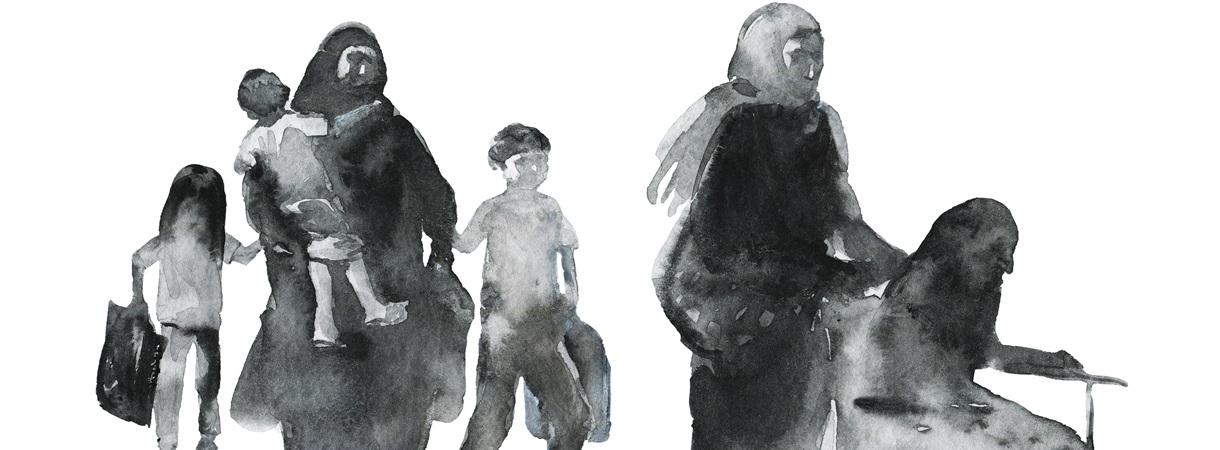A new decision by the Board of Immigration Appeals (BIA) will make it harder for people fleeing gender-based violence to gain asylum in the United States.
On July 18, the BIA published its decision in Matter of K-E-S-G-, finding that people persecuted solely on account of their sex are unlikely to qualify for asylum because sex alone does not meet the definition of a particular social group (PSG), one of the five categories protected from persecution under U.S. asylum law. The BIA added that a social group defined by sex and nationality also fails to meet the PSG definition.
The case involved the asylum application of Ms. S.G., a woman who fled El Salvador for the United States after she was stalked and threatened by gang members in her community. Like many women who flee gender-based violence, she feared returning to El Salvador because of the persecution she suffered, and because her government would not protect her.
U.S. asylum law is based on the United Nations’ guidelines for refugee programs. When these guidelines were created in 1951, member states had just emerged from the horrors of the Holocaust. It is no surprise that they focused on protecting people persecuted for their race, religion, nationality, or political opinion.
However, the United Nations’ guidelines also included a broad term, PSG, to describe people persecuted on account of an identity that did not fit into, but was similar to, the listed categories. After all, societies classify people in different ways over time, so no list could account for all the ways humans target each other for persecution.
Which groups of people meet the PSG definition — and which don’t — has been the subject of debate ever since, particularly when it comes to victims of domestic violence.
To gain asylum in the United States, a noncitizen like Ms. S.G. must show she is part of a listed protected category — race, religion, nationality, political opinion, or membership in a PSG — or that other people around her think she belongs to one of these protected groups. The immigration court or asylum officer then assesses whether the harm the noncitizen suffered, or fears, is “on account of” her protected group membership, and assesses a number of other factors.
If an asylum applicant claims membership in a PSG, she must prove that her PSG meets three criteria. Since 2014, the BIA has defined a PSG as a group of people who share a common characteristic they cannot, or should not, have to change (an immutable trait). The group must have defined boundaries (particularity), and others in the same society must view the group as set apart from the rest of the population (social distinction). This three-part test is supposed to distinguish between social groups that are like race, religion, nationality, and political opinion, and social groups that are unlike asylum law’s other protected groups.
In Matter of K-E-S-G-, the BIA decided that sex fails this three-part test. Even though it found that sex is an immutable trait, the BIA ruled that the PSGs comprised of “women” or “Salvadoran women” lack particularity because these groups are too diverse and have no unifying characteristic that unites their experiences. In particular, the BIA argued that women “encompass[] a diverse cross section of society of widely varying ages, socioeconomic statuses, marital statuses, family backgrounds, and lifestyles.”
But this justificationis troubling since racial, religious, national, and political groups also contain diverse cross-sections of society. Furthermore, the idea that women encompass a diverse cross section of society may be true in some cultures, but certainly does not apply where cultural norms punish women for straying outside expected behavior and block women from accessing specific parts of society, such as positions of religious, economic, and political authority. Nevertheless, K-E-S-G- states that “[g]roups defined solely by the characteristics of sex and nationality contain no narrowing features” — regardless of context.
The BIA also reasoned that if it were to decide that sex is a PSG in Ms. S.G.’s case, it would improperly create a new protected ground in asylum law, contrary to the intent of Congress. However, the BIA itself previously noted that an asylum applicant who seeks protection based on membership in a PSG must prove the existence of her PSG using information about her own social context. Before K-E-S-G-, for example, the BIA found that whether or not “married women in Guatemala unable to leave their relationship” was a PSG depended on “the facts and evidence in each individual case” because “any claim regarding the existence of a particular social group in a country must be evaluated in the context of the evidence presented regarding the particular circumstances in the country in question.”
The BIA also justified its ruling by stating that the U.N. didn’t think about sex when it created its refugee guidelines. But the PSG category often is used to capture categories of persecuted people the U.N. failed to anticipate. The K-E-S-G- decision approvingly cites other PSGs the U.N. drafters certainly did not consider, such as the gay community and victims of female genital cutting.
Importantly, as the BIA acknowledged in its K-E-S-G- decision, some circuit courts have previously expressed skepticism about prior BIA decisions finding that PSGs defined by sex and nationality are too broad and thus lack particularity. Under the Supreme Court’s recent decision in Loper Bright, courts need not defer to the BIA’s interpretations of the asylum statute. Advocates whose clients are denied asylum based on K-E-S-G- and ordered removed can therefore argue in petitions for review that the agency reading of the statute warrants no deference, and instead argue for an interpretation of “particular social group” that accords with the plain text, statutory context, legislative history and purpose, and any prior helpful circuit case law.
Nevertheless, to gain asylum in an immigration court or with an asylum officer, victims of gendered violence will now have to prove a more specific reason for their suffering. For example, a Salvadoran woman fleeing an abusive partner will no longer be granted asylum at this level based on her status as a Salvadoran woman, despite El Salvador’s status as the country with the world’s highest rate of intentional female homicides. But if she can show she’s being targeted as a single mother, and that single mothers are a distinct group in Salvadoran society, her asylum claim still has a chance. As a result, people fleeing gender-based violence are placed in a precarious position where they have to explain why they were targeted for persecution in more detail than their neighbor’s fleeing on account of other protected grounds.
The BIA’s decision in Matter of K-E-S-G- gives asylum seekers persecuted on account of their gender an uphill climb, and their advocates now have a great deal of work cut out for them in an environment where more is demanded of them.
 The American Immigration Council is a non-profit, non-partisan organization.
The American Immigration Council is a non-profit, non-partisan organization. 


